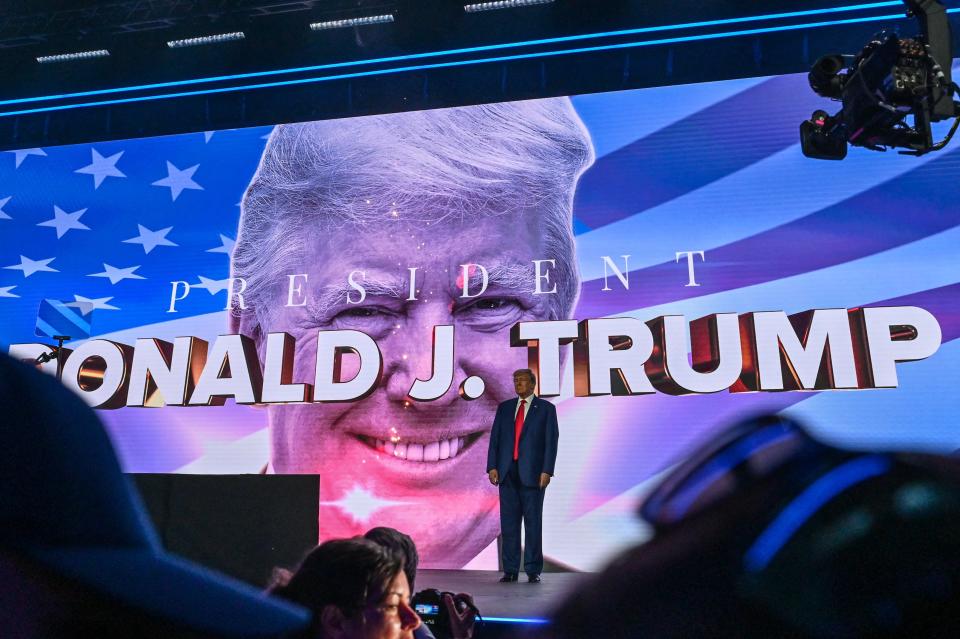Trump or Reagan? Gen Z conservatives must decide what values we really hold true.
- Oops!Something went wrong.Please try again later.
- Oops!Something went wrong.Please try again later.
A generation of young conservatives, my generation, is preparing for an intellectual fight that may determine not only the shape of the conservative movement but also American politics in general for decades to come.
To understand what's at stake, and why it matters, we need to quickly survey the two main branches of conservatism, which are clashing in 2023: Traditional conservatism (think Ronald Reagan, George W. Bush and even Mike Pence) versus populist conservatism (think Donald Trump, Vivek Ramaswamy and Ohio Sen. J.D. Vance).
For decades, American conservatism consisted of a coalition of economic and social conservatives along with civil libertarians. The coalition found its roots in classical liberalism, which promotes individual rights, civil liberties and the free market. For individuals and the economy to flourish, government needed to stay out of the way as much as possible. And the power of the state was viewed as a weapon that inevitably would be used against citizens if not kept in check.
The conservative movement for the most part promoted a consistent belief system that incorporated civil libertarianism, free market capitalism and constitutional originalism.

In the wake of Barack Obama's presidency, however, many conservatives came to believe that progressives were becoming more successful in incrementally but consistently pushing America away from its founding ideals. Cultural clashes between the left and the right were seen as one-sided battles in which progressives won and conservatives surrendered.
In this view, Trump’s unexpected 2016 win was the first counterpunch, thrown by disaffected conservatives who were fed up with losing. Millions of Americans who felt like they had been forgotten by America's elites and our leading institutions showed up at the ballot box to elevate someone who they thought would fight for them, and someone who could not be controlled by either the progressive or conservative establishment.
'Rich Men' resonates across US: Oliver Anthony's 'Rich Men North of Richmond' speaks to how Americans feel. Don't dismiss it.
Trump paved way for new wave of conservatives
Trump's four years in the White House opened the door to the ideas of post-liberalism. One important way that post-liberalism departs from more traditional conservatism is in its view of government. The power of the state isn't to be feared, but rather wielded in favor of conservative ideas and causes.
In the post-liberalist's view, the state’s role as a protector of individual liberty, the view of most conservatives before Trump, is no longer viable.

Emboldened by Trump’s four-year term, post-liberals see the civil libertarian-conservative coalition as a failure, one that only slowed the left’s quest for dominance in the cultural sphere rather than actively fighting for its own values.
What only a few years ago was a narrow movement bubbling outside mainstream conservativism is now gaining in prominence, as politicians like Vance, the freshman senator from Ohio, win elections and begin to reshape the ideological and political landscape.
GOP isn't interested in Gen Z. Republican Party has abandoned young conservatives like me.
Young conservatives within this movement, realizing their opportunity to make waves in a tumultuous political climate, have begun to build their own political infrastructure. Now, organizations such as Turning Point USA have adopted a retributional view of government, one that uses the power of the state to aggressively combat progressives on cultural issues.
“Politics is primarily about wielding power to achieve desired outcomes,” wrote American Postliberal columnist Adam Johnston in a tweet. “The left understands this and acts accordingly. 'Conservatives' don't, hence why they've failed to conserve anything of value.”
Politics is primarily about wielding power to achieve desired outcomes.
The left understands this and acts accordingly.
"Conservatives" don't, hence why they've failed to conserve anything of value.— Adam Johnston (@ConquestTheory) July 10, 2023
A recent startup, The American Postliberal is one of several emerging platforms dedicated to fleshing out the intellectual foundations of their movement.
Some conservatives now favor bigger and stronger government
The emergence of right-wingers who support the expansion of government power has stirred dismay among many young conservatives and right-moderates. The traditional conservatives who staff news sites such as National Review and the Dispatch have been vocal in their opposition to the post-liberal movement.
And a recent startup journal, The Vital Center, is building a platform to make the case that classic liberalism should be preserved.
“We take seriously the contemporary objections to liberalism from the left and the right,” The Vital Center's editorial board wrote. “But we depart from post-liberals in that we aim to rescue, restore, and dignify the liberal project rather than abandon it.”
Opinion alerts: Get columns from your favorite columnists + expert analysis on top issues, delivered straight to your device through the USA TODAY app. Don't have the app? Download it for free from your app store.
The battle between small-government conservatives and the post-liberals, who see government not as the problem but the means to enforce conservative solutions, has already begun. Its outcome, while taking place amid skirmishes in the relatively obscure outposts of conservative media and think tanks, will have profound consequences for many Americans.
What lies ahead may be a stark departure from the era of American conservatism that preceded Trump’s dark-horse run to the White House, and it will pose serious hurdles for those who wish to build a consensus within the GOP.
Conservatives need to do some soul searching. Do we still believe in small government and individual liberty? Is the power of the state to be feared or to be harnessed as a means to our own ends?
Young conservatives, in particular, must answer such questions for ourselves, and then have the courage to stand on our convictions. The fight ahead will be fierce.

Dace Potas is an Opinion fellow for USA TODAY. A graduate from DePaul University with a degree in Political Science, he's also president of the Lone Conservative, the largest conservative student-run publication in the country.
You can read diverse opinions from our Board of Contributors and other writers on the Opinion front page, on Twitter @usatodayopinion and in our daily Opinion newsletter. To respond to a column, submit a comment to letters@usatoday.com.
This article originally appeared on USA TODAY: After Trump, do Republicans believe in big government? GOP must decide

